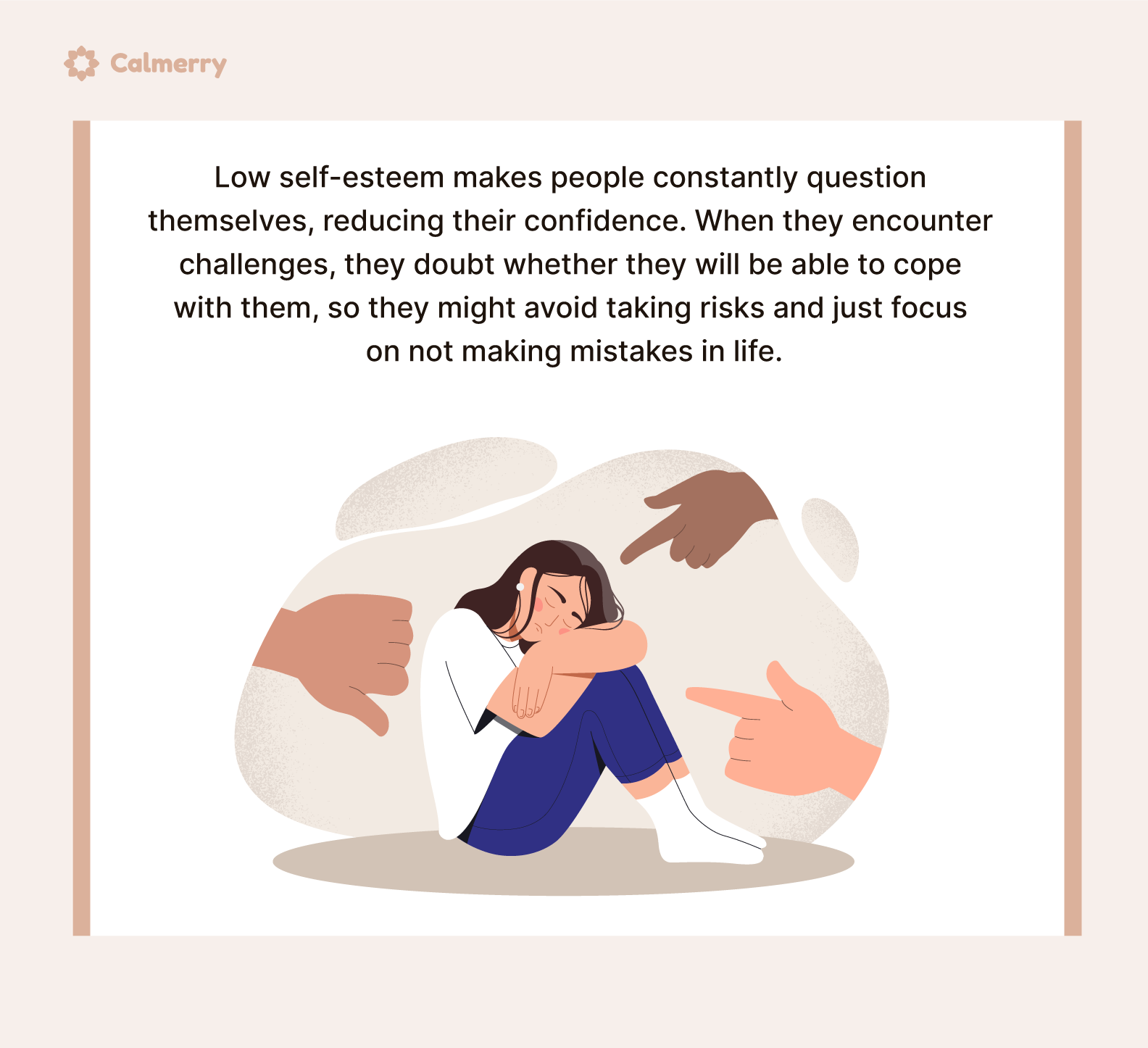Signs of Healthy and Low Self-Esteem, and What to Do About Them

In this article
Self-esteem is important for everyone because it influences all our choices and decisions and affects every aspect of our lives, including our behavior and how we value ourselves.
Low self-esteem can be a problem for a number of reasons. It causes a lack of confidence and can leave you feeling defeated or depressed. People with low self-esteem often make bad choices that prevent them from living happy and fulfilling lives.
On the other hand, high self-esteem could sometimes have undesirable consequences as well. According to research, people with too high self-esteem also tend to have worse relationships and are more likely to engage in risk-taking, aggressive behaviors, and violence. Self-esteem that is too high can also be a sign of narcissistic personality disorder.
Both low self-esteem and excessively high self-esteem are equally bad. The key is to find that perfect balance somewhere in the middle. So ideally, with the help of Calmerry, you should try to achieve a realistic yet positive view of yourself.
But what exactly is self-esteem, and how to tell that your self-esteem needs a boost? What can you do to build healthy self-esteem? Read on to find out.
What is self-esteem?
In psychology, the term self-esteem is used to describe the emotional and cognitive evaluation of our own worth. In simple words, it is the opinion we have of ourselves and how we appreciate and like ourselves. This opinion influences the way we think, feel, and act.
Keep in mind that self-esteem doesn’t have much connection with a person’s ability or talent. For example, a person talented in a specific area may still have poor self-esteem, and a person who is struggling terribly with a particular topic can have healthy self-esteem.
The word self-esteem is often synonymous with such words as self-respect, self-value, and self-worth. It is often seen as a personality trait that is the result of well-established thought patterns, and that means it can be challenging to change.

Factors that influence self-esteem
Self-esteem develops over your lifetime. It begins to form when you are a little child and is shaped by your thoughts, relationships, and experiences.
There are many factors that can influence your self-esteem, including:
- Your inner thinking
- Genetic factors
- Age
- Experiences at home, school, or work
- Potential illness, disability, or injury
- Role and status in society
- How other people react to you
- Media messages
Why is self-esteem important?
Self-esteem plays an essential role in your emotional life, motivation, and success throughout your life. Abraham Maslow’s hierarchy of needs highlights self-esteem as one of the basic human motivations that drives every decision we make.
Everyone needs both self-respect and esteem from other people to grow as a person and reach their full potential. Besides, maintaining good self-esteem is critical to our mental health and helps us build healthy couple relationships.
What are the signs of healthy self-esteem?
Today, self-love and self-confidence are considered important. But you should always keep in mind that “the more, the better” isn’t always the way to go.

People with overly high self-esteem feel superior to others and overlook their own flaws. They are often arrogant and express a feeling of entitlement.
Healthy self-esteem means the perfect balance of self-appreciation and respect for others. People with healthy self-esteem can accurately assess their strengths and weaknesses and believe that they are worthwhile people. They see difficulties as challenges and don’t allow anyone to treat them badly or take advantage of them.
You probably have healthy self-esteem if you:
- Have a positive outlook on life
- Feel confident
- Say what you want and feel
- Have a balanced, accurate view of yourself
- Love yourself as a whole person
- Take care of yourself and look after your own needs
- Don’t compare yourself to others
- Don’t dwell on past negative experiences
- Have healthy boundaries with other people
- Say “no” to things you don’t want to do
- Take responsibility for your actions and feelings
- Believe you are good enough and deserve to be happy
What are the benefits of healthy self-esteem?
When we have good self-esteem and value ourselves, we feel more secure and worthwhile. We have mostly positive relationships with other people and feel confident about our abilities. We are also open to learning new things and getting feedback, which can help us acquire new skills and master them.
People with healthy self-esteem tend to think more optimistically about life in general and focus on growth and improvement. They are also more resilient and find it easier to tackle the ups and downs of life. Besides, they are less likely to stay in unhealthy relationships that are codependent or abusive.
What are the signs of low self-esteem?
People with low self-esteem tend to see themselves, the world, and their future more negatively and critically. They find it difficult to make decisions and excessively depend on the approval of others.
Low self-esteem makes people constantly question themselves, reducing their confidence. When they encounter challenges, they doubt whether they will be able to cope with them, so they might avoid taking risks and just focus on not making mistakes in life.

It can be hard to realize that you have low self-esteem, and often, this feeling has been around so long that it can really feel like it’s just how you see the world. But living with low self-esteem can be tough and emotionally painful.
Here are some common signs of low self-esteem you should be aware of:
- Focusing only on the negative aspects of life
- Lack of boundaries
- Negative self-talk and self-hatred
- Negative body image
- Thinking that other people are better than you and feeling worthless
- Obsession with perfection and feeling that you are not good enough
- Intense fear of failure, assuming the worst even if you have no evidence to support it
- Difficulty in expressing your own needs
- Relying on others to make decisions
- Trouble accepting compliments
- Feeling guilty for everyday actions
- Apologizing frequently
- Blaming others for any troubles in your life
- Avoiding social interactions
- Being hostile when confronted with criticism
- Feeling depressed and anxious
People with low self-esteem may also suffer from physical symptoms – struggle with chronic fatigue or insomnia and have frequent headaches as a result of the emotional burden.
We all may have negative feelings about ourselves from time to time, and it’s OK. But if these feelings are long-lasting, it’s quite possible that you have low self-esteem.
What can cause low self-esteem?
There are many different reasons why people may have low self-esteem – their genes, how and where they grew up, and other life circumstances all play a role.
According to research, self-esteem increases with age, and men usually have a higher level of self-esteem than women. But in Western countries, there is a more pronounced self-esteem gender gap.
Nobody is born with low self-esteem. Self-esteem can start as early as babyhood and develops slowly over time. It is shaped by how much kids feel loved, and how much support or criticism they receive from important people in their life – their parents and teachers. So building children’s self-esteem is an ongoing part of parenting.
We may develop low self-esteem because of difficult or stressful life experiences during childhood and later life:
- Excessive criticism from parents and teachers
- Mental, emotional, physical, and sexual abuse
- Not feeling safe and/or loved
- Physical health problems
- Mental health problems, such as depression and anxiety disorders
- Neglect or being ignored
- Problems while studying or at work
- Bullying, teasing, discrimination
- Financial problems
- Relationships problems like separation or divorce stress
- Unrealistic expectations or failing to certain standards
Some personality traits can also make us prone to negative thinking about ourselves. But mostly, low self-esteem is caused by a set of negative core beliefs, which we develop in childhood when we receive negative messages from our parents, teachers, siblings, friends, and social media.
These opinions and beliefs about our identity can become our way of thinking, so we don’t even question their validity. We may consider them as “truths” for all time, and it can be challenging to forget them or let go of them. But they have nothing to do with reality because they are just stories or labels.
You can’t control your past experiences, relationships, and beliefs, but they don’t have to be your destiny. A major factor that has the biggest impact on your self-esteem is your inner voice – your own thoughts, and they are within your control.

If you work on changing your negative thought patterns, you can develop a more balanced view of yourself, although this transformation doesn’t occur instantly. It takes time and practice, and you may often find that seeking outside help, such as self-esteem therapy online, can be invaluable in making a real change.
Is low self-esteem a mental health problem?
Low self-esteem is not categorized as a mental health illness. But there is a clear link between the way you feel about yourself and your overall mental and emotional well-being.
And if you are living with low self-esteem for a long time, it might lead to mental health problems. For example, it can lead to anxiety, depression, and loneliness, which will only reinforce your negative self-image.
Besides, low self-esteem and other mental health conditions tend to work in a vicious cycle, and it’s often hard to say which comes first. In such cases, you should seek the help of a mental health professional who can help you identify why your self-esteem is low and show you ways to build healthy self-esteem.
How can I improve my low self-esteem?
As you see, having self-esteem issues can negatively affect your mental health, personal and professional relationships. Besides, it can be an obstacle to your financial success because it makes you doubt your abilities and judgment and prevents you from setting ambitious goals and building willpower to achieve them.
If you suffer from low self-esteem, you should remember that it’s not something you have to live with. You have the right to feel good about who you are. And although it might sometimes feel as if changing everything will be difficult, there are lots of things you can try to improve your self-esteem.
Check out this webinar by Diamond Thaxton, a Licensed Mental Health Counselor, and find out expert strategies on improving self-esteem👇🏿
Take control of your thoughts
If you want to change the way you feel about yourself, you should change the way you think about yourself. You need to identify negative thought patterns and test their accuracy.
You shouldn’t immediately believe every thought you have because thoughts are not all facts or rules. Your negative self-beliefs may be outdated, untrue, or may just be opinions or perceptions.

Adjust your negative, self-destructive thought patterns like negative self-talk, confusing feelings with facts, jumping to negative conclusions with no evidence to support them, or seeing only negative things. You should replace them with constructive thoughts using the following strategies:
- Focus on the positive aspects of life
- Encourage yourself and celebrate your accomplishments
- Separate your feelings from your thoughts
- Think about what you’ve learned from a negative experience
Practice self-care
If you constantly forget your own needs and prioritize the needs of other people, you don’t value yourself enough. You should learn to love yourself and take care of yourself. It will help you counter your negative thoughts and build up your self-worth.
Work on developing healthy lifestyle habits – exercise daily for at least 30 minutes a day, keep a healthy balanced diet, and try to get enough sleep. Try yoga, an ancient comprehensive practice and meditation that help bring calm and mindfulness to your life. You’ll feel healthier physically and feel better emotionally.
You should also take care of your appearance and spend time doing things you really enjoy. Take the time to read a book, learn something new, cook a delicious meal, get a massage, or start a new hobby.
Try to do something kind to yourself every day and spend time with positive people who appreciate you and make you feel happy. Avoid toxic friends and stay away from people who make you feel bad about yourself.
Learn self-compassion
It’s easy to be hard on yourself after making a mistake, but it will make things even worse because you’ll be stuck in a self-destructive cycle of self-loathing and shame. You should argue with your inner critic and substitute useless self-criticism with self-compassion. Remember that everyone has flaws and makes mistakes, so you should be kind to yourself. Accept your imperfections and flaws because they make you unique.

If you notice you have started a critical inner monologue, you should think about encouraging things that you could say to your close friend in a similar situation. People tend to be more compassionate to friends and usually give better advice to others than they do to themselves.
Stay mindful of your emotions
Emotional extremes are common for people with low self-esteem – they either get completely swept by emotions or suppress them. You should let yourself have emotions but try to take control of them, so you can experience them in a balanced, healthy way.
That’s why you should learn coping skills to manage anxiety, guilt, anger, fear, worry, and stress. Start a mood journal to process your thoughts and feelings, or use expressive writing. That will help you manage your negative thoughts.
Avoid comparisons
Notice when you start comparing yourself to other people and try to limit comparisons because they lead to insecurity. Besides, they have no sense because they are based on false assumptions. You should accept that every person is different, and we all have our unique talents. There is only one you on this planet, so you should accept yourself as you are and focus your attention on your strengths.
You can make a list of your positive qualities, skills, achievements, and things you do well or enjoy doing. Add to this list regularly and read it when you have negative thoughts about yourself to remind yourself that you are OK. This simple exercise will help you realize just how much you have to offer and that you definitely deserve a more fulfilling, happier life.
Start saying no
You should learn to be assertive, although it can feel difficult at first because you are not used to it. But it’s a really liberating feeling. Before you say “yes” to any request, ask yourself if you really want to do it or if you are ready to agree only because you hope this person will like you.
Remember that your worth doesn’t depend on the approval of other people. So if you don’t want to do something, pause, take a breath, and say “no.” You should decide how much you want to do for other people and set boundaries. Trying to always please people can negatively affect your well-being.

Learn to accept compliments
People with low self-esteem tend to be resistant to compliments and feel uncomfortable about them, although they need them. So you should learn to accept compliments. The best way is to prepare a set of responses and practice them regularly. This way, you will learn to use them automatically when you receive good feedback.
You could make a note of the compliments you get from other people and read it when you doubt yourself or are feeling low.
How to help someone with low self-esteem
Maintaining relationships with someone who has low self-esteem can be tough because such people tend to be more sensitive and vulnerable. So what can you do to provide your family member, friend, or partner with the support they need and help them learn to love themselves?
Be supportive
Show your loved ones that you are always there for them and express your care and concern. Make them feel heard and appreciated, and give them a chance to feel secure in being themselves with you. Accept their thoughts and feelings about them as real and valid for them, and be patient. Offer your friend or partner real, sincere compliments when you can.
Listen to them
Let your family member or friend express themselves by giving them your full attention when they are telling you something, even if you don’t understand them. Let them talk freely because your goal is to demonstrate to them that their opinion matters to you, and that you are ready to listen to them.
They will feel more confident knowing that you think their ideas and concerns are important enough to be heard.

Include them
Try to get your friend or relative to meet other people or try new things. People with low self-esteem focus on negative events and think more about them. So they typically try to avoid different things that they think are embarrassing. That can provoke social anxiety, depression, and isolation.
But if they have positive experiences and see that they can make a positive contribution to different events, it can help them enhance their self-esteem.
That’s why you should involve them in social activities and new experiences if you are sure they can handle them. This way, you can show they are important to you.
Therapy for low self-esteem
Feeling bad about yourself can hold you back in life, so you should work on improving your self-esteem and give yourself a chance to be successful. If you have tried different things to boost your confidence and don’t see significant results, a good idea is to speak with a therapist about your self-esteem issues.
When it comes to addressing low self-esteem, two of the major approaches are psychodynamic therapy and cognitive behavioral therapy (CBT).
Psychodynamic therapy can help you identify the underlying causes or reasons for having low self-esteem and connect your past experiences to present ones that may be influencing your self-esteem. And CBT is a skill-based approach that can help you identify self-defeating thoughts and ineffective behaviors and change them.

Therapy can be a safe place to explore how you think about yourself and understand where your perception of yourself and beliefs came from. A mental health professional can help you identify the root causes of your problems and provide you with effective tools to overcome them.
Therapists will integrate different scientifically supported psychological methods to help you start to relate to yourself in a more positive way, accept who you are, and feel comfortable and secure. With time and work, you’ll be able to develop a healthy relationship with yourself.
Final thought
Self-esteem is the key factor for navigating problems and being successful in every aspect of life. People with healthy self-esteem are more motivated, hopeful, and believe in themselves more.
Low self-esteem is characterized by negative thinking, lack of confidence, and difficulty communicating one’s needs. If you constantly feel that you are not good enough, it can have a negative impact on your behavior, life choices, mental health, and your future.
Building healthy self-esteem is crucial for success. When you learn to love yourself, you strive for a better life – a happier relationship, a more fulfilling career, or recovery from addiction.
When you have low self-esteem, you need to work to change the deep-rooted feelings you have about yourself and adjust your negative thoughts into more positive ones. It’s important to believe that you can change. Although it’s not always easy, working with a therapist can help you identify your strengths and weaknesses, accept who you are, and pave the way for self-empowerment.
online therapy
live video session



